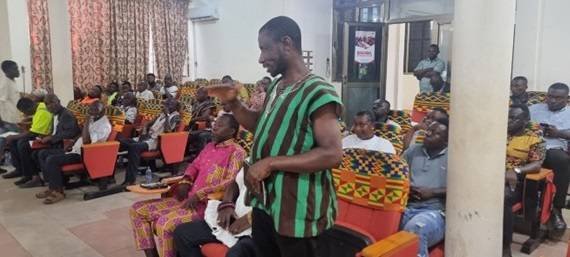The Environmental Protection Agency (EPA) in line with the planetGOLD Ghana Project, has held a consultative workshop for stakeholders in the Artisanal Small-Scale Gold Mining (ASGM) value chain in the Prestea Huni-Valley Municipality.
The purpose of the workshop, which took place last Thursday, was to gather input and expertise from stakeholders in order to facilitate the creation of a comprehensive Social License Protocol (SLP) that is in line with the project’s goals.
The planetGOLD Ghana Project, supported by the Global Environment Facility (GEF), the United Nations Development Programme (UNDP), and the United Nations Industrial Development Organisation (UNIDO), is focused on four main components.
These components includes optimising formalisation through Jurisdictional Approaches (JAs), accelerating financial inclusion and responsible supply chains, enhancing uptake of mercury-free technologies, and fostering knowledge sharing and local capacity building support.
According to Mr Lovelace Sarpong, the Project Coordinator, the project’s main goal was to reduce the risks associated with mercury use in the ASGM sector by enhancing sound chemical management and eliminating pollution hazards, while promoting financial inclusion and transitioning to the formal economy.
He further explained that the projects aimed to build national and jurisdictional capacity to improve the country’s compliance with the Minamata Convention, in line with national environmental and formalisation policies, as well as global initiatives on mercury reduction, responsible supply chains, and mineral resource governance.
In his opening speech, Mr Isaac Dasmani, the Municipal Chief Executive of the Prestea Huni Valley Municipal Assembly, praised the EPA and the project team for their educational efforts in the community.
He highlighted that despite the municipality’s abundant gold deposits, there were challenges in the mining sector.
Mr Dasmani encouraged small-scale miners to embrace the project’s new strategies, including mercury-free interventions, to promote responsible mining practices in the area.
He also urged miners to implement the knowledge gained from the workshop to safeguard their health and the environment.
“I want to encourage the mining companies, both large and small-scale to fulfil their corporate social responsibility to help develop the communities in which they operate, in terms of education, health, women empowerment among others,” he said.
The Safeguard Officer on the Project, Mr Isaac Owusu said mining played a major role in the development of the nation, stating that, about 13 out of the 16 regions in Ghana were endowed with mineral deposits.
He stated that, the small-scale mining value chain support millions of livelihoods of Ghanaians, however, environmental impacts arise during all stages of the mining processes
BY CECILIA LAGBA YADA

